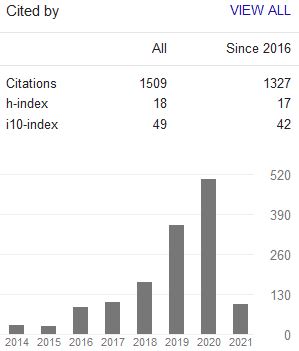MANAGING THE HALAL INDUSTRY AND THE PURCHASE INTENTION OF INDONESIAN MUSLIMS: The Case of Wardah Cosmetics
Abstract
Keywords
Full Text:
PDFReferences
Aaker, J.L. “Measuring Brand Equity: Across Products and Markets”. California Management Review, 38, 3 (1996).
Afriani, S. H. “Islamic Beauty Socio-Semiotic Analysis of Facial Foam and Body”. Journal of Indonesia Islam, 6, 2 (2012).
Ajzen, I., “The Theory of Planned Behavior”. Organizational Behaviour and Human Decision Processes, 50 (1991).
Ali, M. “Confrontation and Reconciliation; Muslim Voices of Maluku Conflict (1999-2002)”. Journal of Indonesia Islam, 1, 2 (2007).
Aziz, Abdul Y, N.V. Chok, “The role of Halal awareness, Halal certification, and marketing components in determining Halal purchase intention among non-Muslims in Malaysia: a structural equation modeling approach”. Journal of International Food and Agribusiness Marketing, 25, 1 (2013).
Dimitrova V, M. Kaneva, T. Gallucci. “Customer Knowledge Management In The Natural Cosmetics Industry”. Customer Knowledge Management, 109, 9,Emerald Insight (2009).
Duffett, R. G. “Facebook advertising’s influence on intention-to-purchase and purchase amongst Millennials”. Internet Research, 25, 4 (2015).
Elson, R. E. “Islam, Islamism, the Nation, and the Early Indonesian Nationalist Movement”. Journal oIndonesia Islam, 1, 2 (2007).
Engebretsen, I. M. S. et al. “Growth effects of exclusive breastfeeding promotion by peer counsellors in sub-Saharan Africa: the cluster-randomised Promise Ebf trial”. BMC Public Health, 14 (2014).
Engel, James F., Roger D. Blackwell, Paul W. Miniard. Perilaku konsumen. Trans. Budijanto. Jakarta: Binarupa Aksara, 1995.
Famiza, N. et al. “Buying Halal Pharmaceutical Products: Do Consumers Have Imperfect Knowledge?”. Pertanika Journal Social Science & Humanities, 25 (2017).
Fan, Y. and Y. Miao. “Effect Of Electronic Word-Of-Mouth On Consumer Purchase Intention : The Perspective Of Gender Differences”. International Journal of Electronic Business Management, 10, 3 (2012).
Fishbein, Martin, and Icek Ajzen. Belief, Attitude, Intention, and Behavior: An Introduction to Theory and Research. Reading, Mass: Addison-Wesley, 1980.
Gillani, F. “Impact of Peer Pressure and Store Atmosphere on Purchase Intention : An Empirical Study on the Youngsters in Pakistan”. International Journal of Academic Research in Business and Social Sciences, 2, 7 (2012).
Gillani, S. H. B., F. Ijaz, and M.M.S. Khan. “Role of Islamic Financial Institutions in Promotion of Pakistan Halal Food Industry”. Islamic Banking and Finance Review, 3, 2 (2016).
Global Muslim Travel Index 2019 https://www.crescentrating.com/reports/global-muslim-travel-index-2019.html. Accessed on 14 May 2019.
Halsey, George D. Bagaimana Memimpin dan Mengawasi Pegawai Anda. Jakarta: Rineka Cipta, 2004.
Hanifah et al. “Approach in Halal-Logistics Operation”. Pertanika Journal Social Science & Humanities, 25 (2017).
http://www.wardahbeauty.com/id/about.html.
https://www.bps.go.id/.
https://www.facebook.com/wardahbeauty/
https://www.giesummit.com/
Jawa Pos, 17 April 2019
Johra, K.Y, A.M. Razzaque. “Service Quality and Satisfaction in The Banking Sector”. International Journal of Quality & Reliability Management, 31, 4 (2014).
Keller, Kevin Lane. Strategic Brand Management: Building, Measuring, and Managing Brand Equity. New Jersey: Pearson Education Publisher, 2008.
Kotler, Philip & Kevin Lane Keller. Manajemen Pemasaran. Jakarta: Erlangga, 2009.
Kotler, Philip, & Gary Armstrong. Prinsip - prinsip Pemasaran. Jakarta: Erlangga, 2008.
LPPOM MUI, Persyaratan Sertifikasi Halal [Online]. http://www.halalmui.org/newMUI/index.php/main/go_to_section/39/1328/page/1.
Mukhtar, A. and M.M. Butt. “Intention to choose Halal products: the role of religiosity”. Journal of Islamic Marketing, 3, 2 (2012).
Rasyid, Abdul et.al. Hukum Bisnis untuk Perusahaan: Teori dan Contoh Kasus. Jakarta: Prenada Media, 2017.
Ratnadinata, Adelia. “Hampir Separuh Kasus Penyakit Kulit Karena Produk Kosmetik”. www.health.detik.com.
Razzaque, Mohammed Abdur. “Reliogisity and Muslim Consumers Decision Making Process in a Non-Muslim Society”. Journal of Islamic Marketing, 4, 2, Emerald Insight (2012).
Samino, Saring Marsudi. Layanan Bimbingan Belajar. Surakarta: Fairuz Media, 2011.
Sandi, A. S. P., Marsudi and D. Rahmawanto. “Persepsi Label Halal Terhadap Keputusan Pembelian Konsumen Pada Produk Minuman Berenergi”. Jurnal Manajemen Bisnis, 1, 2 (2011).
Sari, D. K., D. Mizerski, and F. Liu. “Boycotting foreign products: a study of Indonesian Muslim consumers”. Journal of Islamic Marketing, 8, 1 (2015).
Schiffman, L. G and L.L. Kanuk. Consumer Behavior. New Jersey: Penerbit Prentice–Hall International Inc., 2010.
Sial, Mahdia Farrukh, Gulzar Amir, Noor-ul-Ain Riaz, Bilal Nawaz. “Impact of Labeling and Packaging on Buying Behavior of Young Consumers with Mediating Role of Brand Image”. Interdisciplinary Journal of Contemporary Research In Business, 3, 8 (2011).
Subianto, T. “Studi Tentang Perilaku Konsumen Beserta Implikasinya Terhadap Keputusan Pembelian”. Jurnal Ekonomi Modernisasi, 3, 3 (2007).
Sukmawati, Lili. Analisis Pengaruh Label Halal Terhadap Brand Switching (Kasus Produk Kosmetik Wardah). Bogor: Institut Pertanian Bogor, 2006.
Sumarwan, Ujang. Perilaku Konsumen (Teori dan Penerapannya dalam Pemasaran). Bogor: PT. Ghalia Indonesia, 2011.
Sumarwan. Riset Pemasaran dan Konsumen. Bogor: IPB Press, 2010.
Tjiptono, F., G. Chandra. Service, Quality & Satisfaction. Yogyakarta: Andi Offset, 2011.
UU. No. 33 Tahun 2014 tentang Undang-undang Jaminan Produk Halal.
Wu, P.C.S., GYY. Yeh, C.R. Hsiao. “The effect of Store image and service quality on brand image and purchase intention for private label brands”. Australian Marketing Journal (2015).
Yas et al. “Purchase Intention of Islamic Brand Product among Non- Muslim Customers”, in Pertanika Journal Social Science & Humanities, Vol. 25, 2017.
DOI: 10.15642/JIIS.2019.13.1.200-229
Refbacks
- There are currently no refbacks.
Indexed by:
Journal of Indonesian Islam (ISSN 1978-6301 and E-ISSN 2355-6994) is published by the Postgraduate Program (PPs) and the Institute for the Study of Religion and Society (LSAS), State Islamic University (UIN) of Sunan Ampel Surabaya.
Journal of Indonesian Islam by http://jiis.uinsby.ac.id/index.php/JIIs/index is licensed under a Creative Commons Attribution-ShareAlike 4.0 International License.
Copyright ©2020 State Islamic University (UIN) of Sunan Ampel Surabaya. Powered by Public Knowledge Project OJS.







